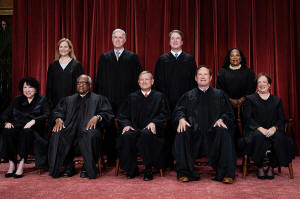New Supreme Court term confronts justices with Trump's aggressive
assertion of presidential power
[October 04, 2025]
By MARK SHERMAN and LINDSAY WHITEHURST
WASHINGTON (AP) — A monumental Supreme Court term begins Monday with
major tests of presidential power on the agenda along with pivotal cases
on voting and the rights of LGBTQ people.
The court's conservative majority has so far been receptive, at least in
preliminary rulings, to many of President Donald Trump's aggressive
assertions of authority. Liberal Justice Ketanji Brown Jackson invoked
the Calvin and Hobbes comic strip after one such decision allowing the
cut of $783 million in research funding.
"This is Calvinball jurisprudence with a twist,” Jackson wrote.
“Calvinball has only one rule: There are no fixed rules. We seem to have
two: that one, and this administration always wins.”
The conservative justices could be more skeptical when they conduct an
in-depth examination of some Trump policies, including the president's
imposition of tariffs and his desired restrictions on birthright
citizenship.
If the same conservative-liberal split that has marked so many of
Trump's emergency appeals endures, "we are in for one of the most
polarizing terms yet,” said Irv Gornstein, executive director of the
Supreme Court Institute at Georgetown University’s law school.
The justices will pass judgment in the next 10 months on some of Trump's
most controversial efforts.
3 major cases on presidential power are on the docket
The justices are hearing a pivotal case for Trump’s economic agenda in
early November as they consider the legality of many of his sweeping
tariffs. Two lower courts have found the Republican president does not
have the power to unilaterally impose wide-ranging tariffs under an
emergency powers law.

The lawsuit filed by states and small businesses argues Trump cannot
usurp Congress’s taxation powers by declaring national emergencies and
using tariffs to address them.
The administration, though, says the law does give the president the
power to regulate importation, and that includes tariffs. Four
dissenting judges on a federal appeals court in Washington bought that
argument, mapping out a possible legal path at the high court.
In December, the justices will take up Trump's power to fire independent
agency members at will, a case that probably will lead the court to
overturn, or drastically narrow, a 90-year-old decision. It required a
cause, like neglect of duty, before a president could remove the
Senate-confirmed officials from their jobs.
The outcome appears to be in little doubt because the conservatives have
allowed the firings to take effect while the case plays out, even after
lower-court judges found the firings illegal. The three liberal justices
have dissented each time.
Another case that has arrived at the court but has yet to be considered
involves Trump's executive order denying birthright citizenship to
children born in the United States to parents who are in the country
illegally or temporarily.
The administration has appealed lower-court rulings blocking the order
as unconstitutional, or likely so, flouting more than 125 years of
general understanding and an 1898 Supreme Court ruling. The case could
be argued in the late winter or early spring.
The court could hand Republicans significant victories on voting
rights and campaign finance
The future of electoral districts with majorities of Black, Hispanic or
Native American voters hangs in the balance in a case about
congressional redistricting in Louisiana that will be argued in
mid-October.
The Republican-led state has abandoned its defense of a political map
that elected two Black members of Congress. Instead, Louisiana wants the
court to reject any consideration of race in redistricting in a case
that could bring major changes to the Voting Rights Act.
Chief Justice John Roberts and the other five conservative justices have
been skeptical of the consideration of race in public life, including a
decision in 2023 that ended affirmative action in college admissions.

[to top of second column]
|

Members of the Supreme Court sit for a new group portrait at the
Supreme Court building in Washington, Oct. 7, 2022. (AP Photo/J.
Scott Applewhite, File)

Louisiana's position would allow it and other Republican-controlled
states in the South to draw new political maps that eliminate
virtually all majority Black House districts, which have been
Democratic strongholds, voting rights experts say.
The justices failed to decide the case in June after hearing
arguments a first time last winter. The court does not need to go as
far as Louisiana wants to reject the congressional map.
But a second round of arguments is a rare occurrence at the Supreme
Court, and sometimes presages a major change by the justices. The
Citizens United decision in 2010 that led to dramatic increases in
independent spending in U.S. elections came after it was argued a
second time.
Republicans, including the Trump administration, also are behind a
drive to wipe away limits on how much political parties can spend in
coordination with candidates for Congress and president.
The justices are reviewing an appellate ruling that upheld a
provision of federal election law that is more than 50 years old.
Democrats had asked the court to leave the law in place, and the
Supreme Court upheld it in 2001.
But Roberts, who just marked his 20th anniversary as chief justice,
has led a court that has struck down one campaign finance regulation
after another.
No date for arguments has been set.
Transgender women and girls face a test over their participation
on school sports teams
More than two dozen states have enacted laws barring transgender
women and girls from participating in certain sports competitions.
The justices are hearing cases from Idaho and West Virginia, where
transgender athletes won lower court rulings.
The Supreme Court in June upheld a ban on gender-affirming care for
transgender youth, but pointedly did not decide any broader issues
about transgender rights.

They quickly agreed to take up the state appeals, which raised
questions under the Constitution's guarantee of equal treatment and
the federal law known as Title IX that dramatically expanded the
participation of girls and women in sports in public schools and
colleges.
The court has yet to set an argument date.
Justice Samuel Alito is most likely possible retirement in 2026
Alito turns 76 in April, young by Supreme Court standards. But he
might not want to stay around and gamble on the possibility of
Democrats flipping the Senate in next year's elections and seeing a
Democrat capture the White House two years later.
Retiring next summer would allow Trump to name a similarly
conservative but much younger replacement who would almost certainly
win confirmation from the Republican-led Senate.
For close watchers of the court, Alito has done only one thing out
of the ordinary: signed a contract to write a book that is expected
out next year. Even as his junior colleagues have moved quickly to
sign book deals. Alito, by contrast, waited nearly 20 years.
He did not respond to a request for comment for this story.
Alito is not the oldest justice. Clarence Thomas is 77, but he has
shown no signs of leaving, certainly not before he is set to become
the longest-serving justice in U.S. history in 2028.
All contents © copyright 2025 Associated Press. All rights reserved |